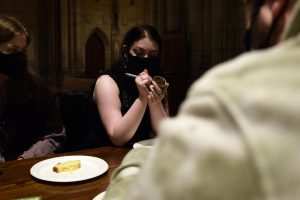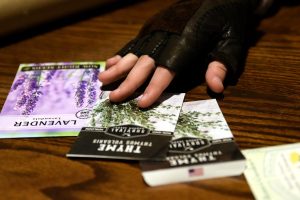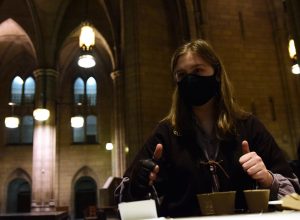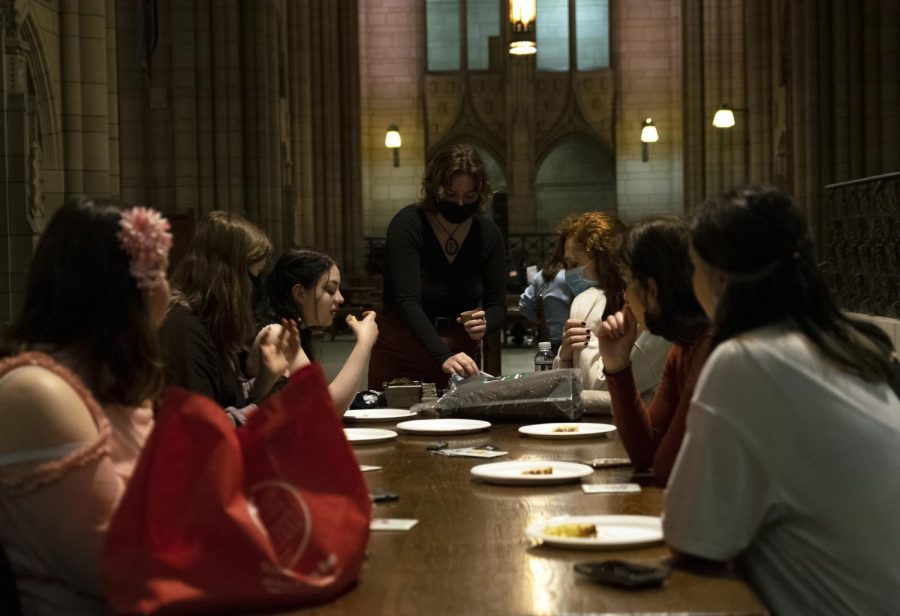‘Connected to nature’: Pagans at Pitt reflect on spring, spirituality
Clare Sheedy | Assistant Visual Editor
Members of the Pagans at Pitt club eat lemon cake during their Ostara celebration to commemorate the Spring equinox last Sunday.
March 27, 2022
Eliza Pacifico remembers floating above their body in high school. At first, they thought they were dreaming.
“Always, at the end, I would look down at my body and, like, there I was. I could actually see myself sleeping in my bed in my room,” Pacifico said. “Then I would actually fall back into my body. And everytime I did that, I would wake up and feel — like I actually felt my stomach drop.”
Pacifico, a junior nursing major, is a member of the new Pagans at Pitt club. Founded last semester by Kaitlin Keslar, a senior psychology major, the club meets Sundays in the Cathedral of Learning. About 10 people are active in the club, according to Keslar.

(Clare Sheedy | Assistant Visual Editor)
Keslar said she decided to start the club after realizing there was no space for witches and pagans on campus to meet.
“I wanted an in-person community because sometimes I don’t feel like talking to people just online,” Keslar said. “I figured there must be others out here at Pitt.”
Pacifico said they always felt “super connected to nature” while growing up, and had a strong intuition — knowing what song was going to come on the radio next, or what episode was going to play next on their family TV. It wasn’t until they found communities of witches during high school that they “came into” their spiritual practice.
“I was just like, this feels right for me,” Pacifico said. “Then I started looking into it and researching.”
Maighread Southard-Wray, a sophomore anthropology major and the club’s vice president, said they set a topic for discussion at each meeting. Sometimes, though, the members just “hang out and chat,” according to Keslar.
While paganism is a religious practice, Southard-Wray said witchcraft is “secular.”
“You can have a religious association and be a witch, or you can not,” Southard-Wray said. “I know people who have no spiritual or religious kind of home, who are witches and practice really fascinating forms of witchcraft.”

(Clare Sheedy | Assistant Visual Editor)
Many club members use tarot cards, crystals and pendulums in their practice. During their Ostara celebration last week, club members wrote intentions on pieces of paper that they then planted in soil. Keslar wrote “good grades.”
“Part of the intention is that it’s not just goals that we want to work on for ourselves,” Keslar said. “It’s like asking the universe for help with working on those goals, asking whatever deities or whatever is out there to steer us in the right direction. Help us out.”
Ostara is a pagan holiday that celebrates the spring equinox and “return of the light,” according to Keslar. Keslar said the holiday historically marked when to start planting crops in agricultural communities. While the holiday is tied to the Germanic pagan goddess Eostre, club members said it doesn’t have to be celebrated in her name.
T., a junior political science major, said “everyone sees things differently,” and that there’s no one right way to practice witchcraft or paganism. T. asked that a pseudonym be used for privacy concerns.
“Everyone’s different, but I do believe that there’s a universal energy,” he said. “Something created the universe and I feel like you can tap into it.”

(Clare Sheedy | Assistant Visual Editor)
Many members of Pagans at Pitt come from a Christian background, including Pacifico. They said they never felt Christianity was “hands-on enough” for them, and realized as they grew up that they wanted a more “active” and “self-directed” spiritual life.
T. also grew up in a Christian household. He said he “enjoyed” going to Sunday mass with his family, and attending Catholic Sunday school, because it felt “active” to him — especially carrying the cross while being an altar server. But as he grew up, he became uncomfortable with his relationship with the church.
“Getting older and being gay, I just couldn’t be comfortable there anymore,” he said.
Keslar, who decided to “take up” witchcraft after her first high school breakup, said she swore to herself that she was either going to become “a nun and swear off men” or take up witchcraft. She eventually chose witchcraft when she realized she was “too queer for Catholicism.”
T. said he often thinks about the relationship between queerness and witchcraft, which he thinks has “a lot to do with being rejected from where you were brought up,” and coming into a community of “more open-minded people.” Southard-Wray agreed, saying they think witchcraft and paganism attract queer people.
“Part of why it’s so attractive to queer folks is because it’s very freeing and it’s very self-directed,” Southard-Wray said. “Coming to witchcraft and paganism has been part of unlearning the things you grew up with. There’s not really a wrong way to explore your practice.”
Southard-Wray, whose ancestors came to America during the Irish Potato Famine, said they “work in a lot of Celtic traditions.” They said they see their witchcraft as a way of “reclaiming old things and old traditions.”
Like Southard-Wray, Keslar also has ancestral ties to her witchcraft — though she wasn’t aware of this until taking a DNA test. Keslar said she always felt a special connection to Egyptian and Greek deities, but it wasn’t until she took a DNA test that she found she has Egyptian and Greek ancestry.
“I found out I’m a little bit Egyptian, and that was very weird for me,” Keslar said. “I also had always thought that my family was Italian, but then it turns out that they were Greek before they were Italian. When I found that out I was like, ‘Yeah, that makes sense.’”
Though some club members, like Keslar, work with specific deities, not all do. T. said he sees deities as “sort of a force that is given a name and a character and a story,” adding he doesn’t “see them as real people, just a way for people to process energy.”
Regardless of belief, Keslar said there is an intrinsic magic in nature that everyone can appreciate.
“Even if you don’t believe in any specific pagan gods or any specific pantheons, nature is very tangible,” Keslar said. “You can hold a pot of dirt, and, like, there’s magic in watching plants grow.”
Editor’s Note: This article was updated to use a pseudonym for T. due to privacy concerns.








